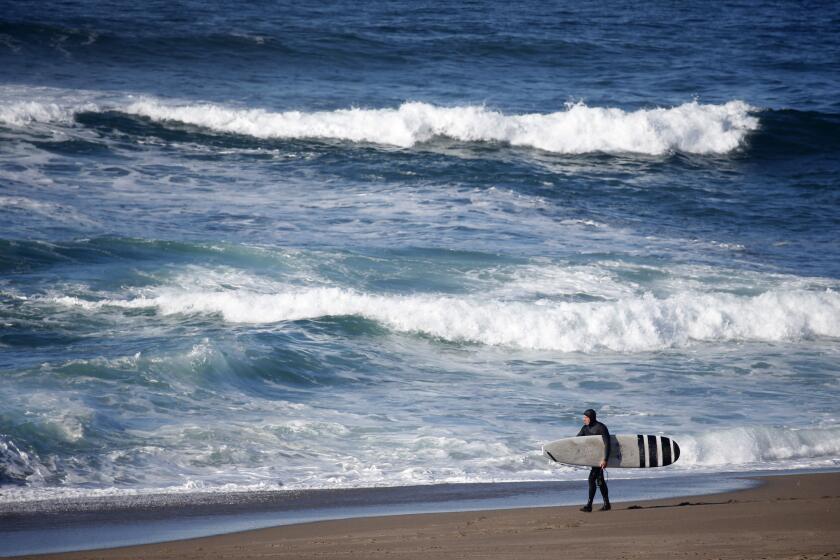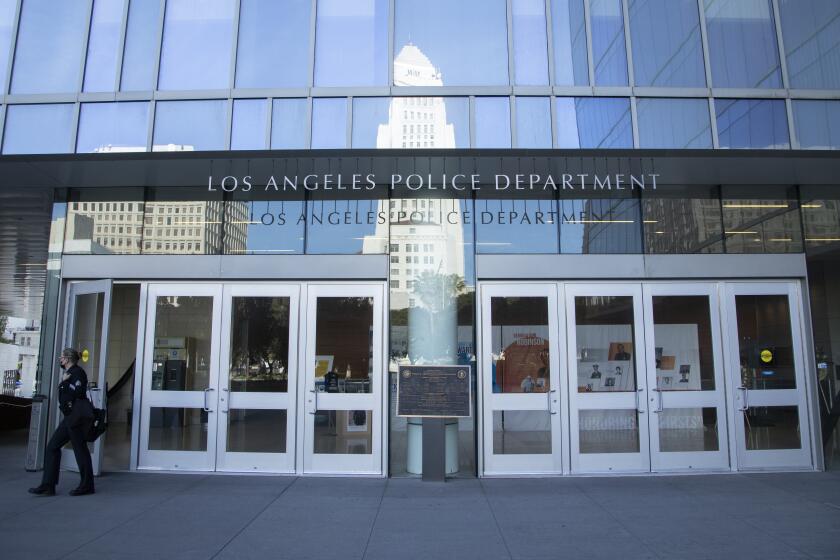Cutting the Fog at City Hall : Government: City administrator heads off row over illegal garage conversions by simply suggesting that parking law be changed.
Often at San Diego City Hall, frustrated citizens leave feeling that, having simply asked the time, they are told how to build a watch--and why it can’t be done in their case. On Thursday, dozens of angry East San Diego residents were given the correct time, and given it quickly.
Apparently defusing the kind of issue that makes residents fume, city administrators recommended Thursday that building regulations be amended to permit people to park their cars in their driveways--an act that technically, in most cases, is now illegal.
With many residents having converted their garages to extra bedrooms or family rooms, an increasing number of homes, especially those in older neighborhoods, no longer comply with city regulations requiring off-street parking 12 feet or more from the curb. Most homeowners did not obtain necessary city permits before making the garage conversions, many of which were made in the early 1960s.
Though city officials generally have not enforced the off-street parking provision, the issue came to a head recently when a zealous city inspector cited a number of East San Diego residents for illegal garage conversions. Most of those cited were told that they had 30 days to correct the situation, either by tearing out the converted room and restoring it as a garage, or by getting a permit for it, which would require building a new driveway.
Worried about losing their extra living space, the residents--angered by what one termed “the zoning Gestapo”--turned out in force Thursday for a special meeting of the council’s Transportation and Land Use Committee.
There, Deputy Planning Director Joe Flynn proposed a solution so simple as to be immediately hailed as ingenious by council members and citizens alike.
In a plan unanimously endorsed by the council panel, Flynn suggested that city laws be changed so that people can, in most cases, legally park two cars in their driveways and thus retain their converted garages. People with single-car garages also would be able to park two cars in front of their garages, though some might have to widen their driveways to do so.
“That is just the kind of thinking we like around here,” Councilwoman Judy McCarty gushed.
“So simple it’s brilliant,” an Oak Park resident added, while Councilman Wes Pratt praised Flynn’s idea as “creative, responsive and sensitive.”
Flynn himself characterized the proposal, which must be approved by the Planning Commission and council, as little more than a recognition of reality.
With the garage conversions being especially commonplace in middle-income communities--where the garage alterations are seen as a low-cost way of expanding limited living space--city officials realized that rigidly enforcing existing laws would simply impose hardships on many families and engender animosity toward City Hall.
“Most people can’t afford to go out and get a $30,000 loan for (a room addition),” said East San Diego resident Robert Insunza. “I don’t think it’s going to hurt anybody to throw down 200 square feet of carpet and put a window and maybe some cable TV for the kids . . . in the garage. I hope that the city Planning Department has a little compassion.”
Echoing Insunza’s sentiment, McCarty added: “These are law-abiding citizens who are just trying to make a nice life for themselves. They shouldn’t get cited.”
At the heart of the controversy is a question that one East San Diego resident shouted from the audience at Thursday’s hearing: “Why (does) the city care if people park in their own driveway in front of a garage conversion?”
The answer, Flynn said, involves both aesthetics and safety. The off-street parking requirement is intended, he explained, to ensure that there is adequate visitor parking and that streets are not so cluttered with cars as to impede fire trucks, police cars or ambulances.
In addition, the existing law helps to preserve more space for landscaping between driveways and property lines. That fact is particularly appreciated by those people who, for reasons of personal taste, simply do not like looking at their neighbors’ cars parked outside, even if the vehicles are in the neighbors’ own driveways.
Although city inspectors do not ticket people for parking in their driveways, they do respond to complaints from neighbors. The recent citations that led to the uproar in East San Diego, in fact, were spawned by one such complaint, city administrators said.
Safety considerations also play a role in city officials’ attitude toward the unauthorized garage conversions. Some do not meet building codes, lacking proper ventilation, windows, doors or heating--problems that will need to continue to be closely monitored, Flynn said, even if Thursday’s proposal becomes law later this year.
Moreover, some converted garages are used as illegal rental units, increasing density in single-family neighborhoods. Such units--long the source of controversy, particularly in college-area neighborhoods--will remain illegal, Flynn stressed.
Flynn also cautioned that, in solving one problem, Thursday’s proposal conceivably could pose others. For example, he noted that some older homes have short driveways, causing cars parked there to extend past sidewalks or even into the street. He also predicted that the upcoming hearings will draw complaints from those people who, for varying reasons, believe that garages are for cars, not people.
“When you’re looking at something with citywide impact, you’re usually not going to find unanimity,” Flynn said. “And I certainly don’t expect to find it here.”
More to Read
Start your day right
Sign up for Essential California for news, features and recommendations from the L.A. Times and beyond in your inbox six days a week.
You may occasionally receive promotional content from the Los Angeles Times.






